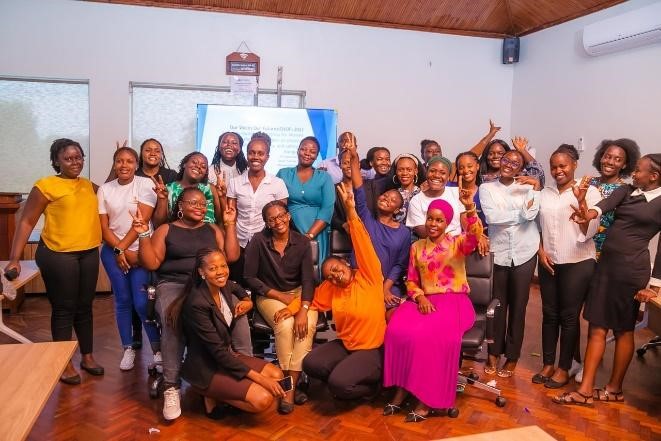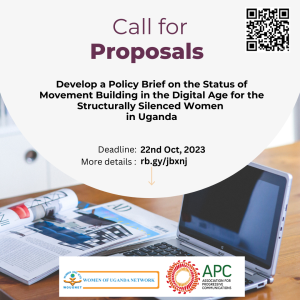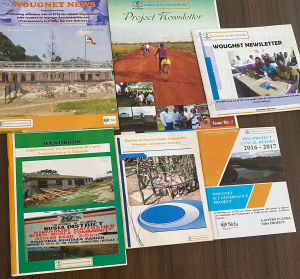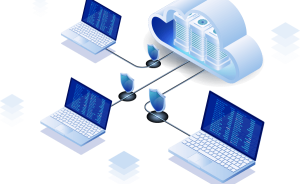Introduction
Over the years, Uganda has been known for its participation in human rights activism, with women playing a significant role in championing various causes. In the pursuit of justice, equality and human rights, Women Human Rights Defenders (WHRDs) have consistently proven their resilience and dedication to the cause.
However, in the increasingly digital world, they face unique challenges, particularly when it comes to digital security, safety and physical security. Some of these challenges include online harassment, lack of digital literacy, and physical threats from perpetrators, mainly because of the kind of work they do.
Recognizing this, WOUGNET organised transformative capacity-building workshops in Kampala and Jinja districts under the Our Voices Our Futures (OVOF) project. These workshops aimed at empowering Women Human Rights Defenders with essential skills in digital security, physical safety, and overall safety, to enable all women to articulate, demand and access their human rights and advance gender equality. This is because WHRDs play a crucial role in advancing human rights and social justice.
The two workshops delved into Digital security and safety facilitated by Aidah Bukabuza from Aydia Gender Tech Initiative and physical security facilitated by Karis Moses Oteba from DefendDefenders.
Struggles faced by Women Human Rights Defenders
Women Human Rights Defenders oftentimes work with sensitive information, such as case details, witness testimonies and contact information. Therefore, ensuring the security of this data is very significant to the rights and safety of those involved.
“Many women human rights defenders handle confidential information, and breaches which can expose them to individuals who can compromise their advocacy efforts”, a human rights activist highlighted.
In many regions of the country, human rights defenders face surveillance from both state and non-state actors. In this case, digital tools such as VPNs and practices such as Two-Factor Authentication are essential to protect against unwarranted surveillance and maintain both their online and physical communications.
Additionally, WHRDs often have ethical and legal responsibilities to protect their identities. It is therefore important that they practice responsible and ethical behaviour online, including refraining from cyberbullying, harassment, and other harmful online activities.
Strategies Women Human Rights Defenders can use to ensure digital and physical security
Many WHRDs rely on digital platforms for advocacy and awareness campaigns. Therefore, ensuring the security of their websites, social media accounts, and communication channels helps maintain their online presence and impact.
“A secure digital environment for WHRDs promotes freedom of speech and expression, enabling them to amplify their voices without the risk of censorship/ intimidation”, a WHRD noted.
Risk assessment involves identifying potential vulnerabilities and threats and developing strategies to mitigate them. The participants identified vulnerabilities and risks such as the nature of work, sexual harassment, imprisonment, and gender roles, among others. In order to avoid such threats were encouraged to and vulnerabilities, WHRDs were encouraged to proactively address the risks before they escalate i.e., be aware of the risk, increase capacity and decrease vulnerability.
Risk assessment breeds a culture of preparedness, thus empowering WHRDs to make informed decisions about their advocacy activities.
Situational awareness is the ability to understand one’s environment, identify potential threats, and adapt to changing circumstances. It is important for WHRDs to respond to risks and threats effectively. This promotes informed decision-making when facing unforeseen challenges.
Physical security and safety measures are crucial to safeguard WHRDs from physical threats and harm such as arrests, sexual harassment, loss of lives and imprisonment. It involves secure housing, secure transportation and protection of workplaces.
Physical security provides human rights defenders with a sense of security during their advocacy activities.
Self-care refers to the practice of maintaining physical, mental and emotional health. Women Human Rights Defenders often put their personal well-being at risk for the greater good. However, it is important to always consider their health while carrying out advocacy activities such as adequate exercise, enough rest, setting and observing personal boundaries, learning more so as to add value to yourself and being sensitive to others so as to avoid unnecessary conflict.
Recommendations
- Women Human Rights Defenders can use strong passwords i.e., complex and unique passwords for online accounts to prevent unauthorized access. These may include Roman numerals, numbers and unique symbols.
- Enable 2FA ( Two Factor Authentication) wherever possible to add an extra layer of security to online accounts.
- Use encrypted communication tools such as Signal or WhatsApp for sensitive discussions, avoiding unsecured platforms.
- When organizing meetings, ensure safe and neutral spaces to minimize risks associated with physical gatherings. Always meet in public places such as restaurants.
- Connect defenders with legal resources and organizations that can provide assistance in case of legal challenges.
- Ensure proper documentation of incidents, threats, and attacks, including photos, videos, and witness statements when possible.
Conclusion
One of the most significant outcomes of the workshops was the sense of community fostered. Women from different backgrounds and organisations came together to share their experiences, challenges, successes and strategies as far as digital and physical security are concerned.
It’s important to recognize that the security landscape is ever-evolving, and tailored security assessments and measures should be continuously updated to adapt to new threats. A holistic approach that combines digital and physical security measures, along with community and international support, is essential for the protection of Women Human Rights Defenders.
Written by; Irene Marunga, Communications Associate






